Burlington's City Hall Park: How city's centerpiece reflects community's pain and beauty
Editors note: This story was reported in City Hall Park over the course of three weeks. The Free Press spoke with more people in the park who were willing to share than could fit this story. The stories of more people are told in the attached photo gallery.
City Hall Park's well-manicured lawns and flower beds hold multiple realities.
Free concerts and a weekly art market organized by Burlington City Arts regularly fill the park with music, dogs, and families during the warm months of the year. Its colorful tables and fountains draw tourists and townies daily to rest, play and visit.
Steps away from splash pad jam sessions and classical music performances, however, are people who have been awake for days because they fear losing even more than they've already lost. Many are unhoused and battling addiction or mental illness.
Passerby avoid eye contact and parents pull their children in the opposite direction. Police hover on street corners and park pathways nearby.
Many park visitors have theories on what could solve the startling juxtaposition, but the issues on display in the park cannot be solved with one grand idea, nor can they be solved quickly. For the time being, the people of the park are learning to live with the tensions and suffering they see and experience, and seek a better way forward.
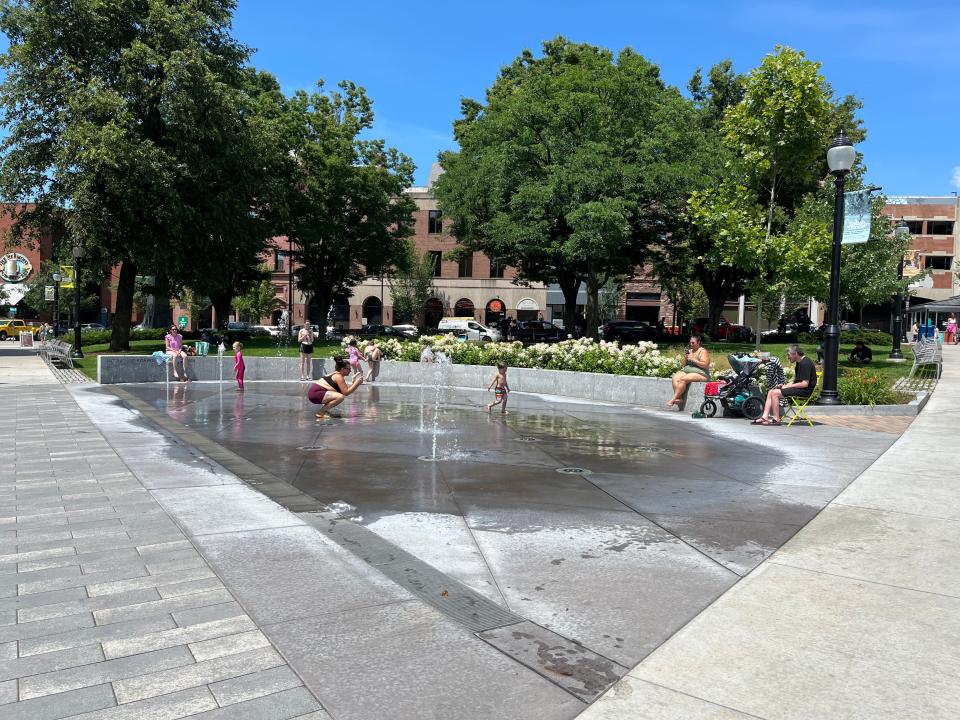
‘Out here it’s hard to go to sleep’
Sylas, also known as Jitterbug by his friends, sits on a bench at the north end of the park. He covers his mouth with his hand, self-conscious about the bleeding scabs on his face.
He explains that Fentanyl, to which he is addicted, is now sometimes laced with xylazine. Xylazine is a sedative that also eats away at human flesh if it gets in open wounds like the pimples on his face. It can also cause serious wounds if someone injecting it doesn’t hit the vein, sometimes resulting in amputations, according to a public safety alert from the United States Drug Enforcement Administration. Sylas's blackened fingernails were also a sign of the drug’s toll on his body, he said.
But drugs aren’t the only thing affecting the 19-year-old’s body. He’d been up for eight days, he approximates, unless he counted being passed out from the xylazine.
“Out here it’s hard to go to sleep, you get robbed when you go to sleep,” he said.
The other day he had awoken from a xylazine-induced sleep to paramedics shaking him, thinking he may have overdosed.
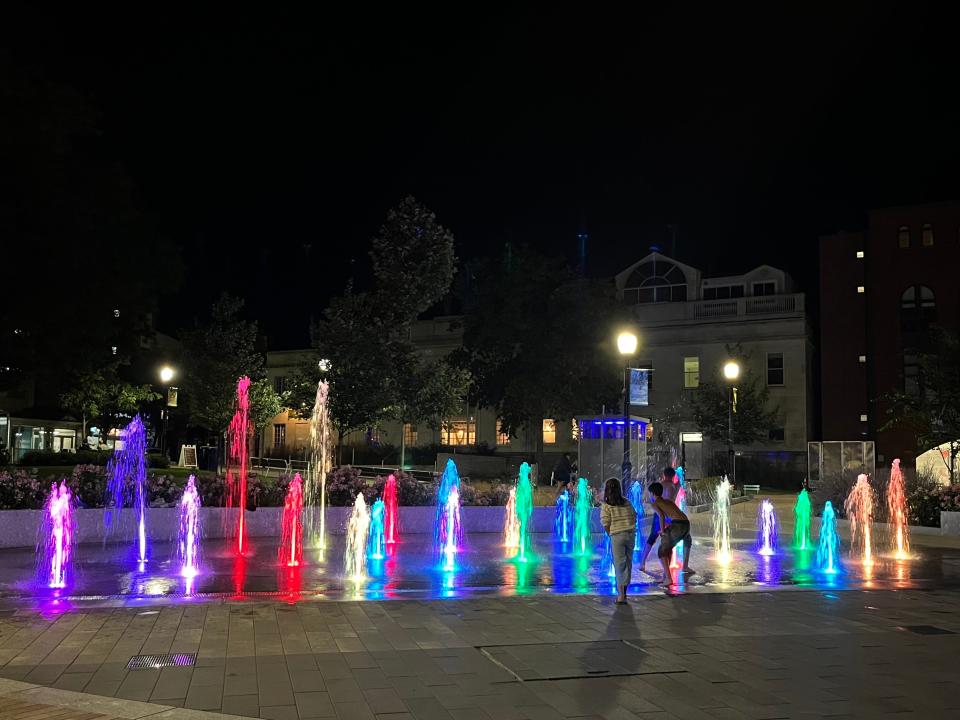
Emergency calls for overdoses have more than doubled in the city since last year, according to Burlington Police Department data presented at the Police Commission’s August meeting. Burlington Police Chief Jon Murad said at the commission’s April meeting that current calls for overdoses sometimes are a result of new drugs, including xylazine, which cause alarming symptoms such as shallow breathing and collapse that mimic overdose.
Sylas, originally from Barre, has been on and off the streets since he was 14. He requested the Free Press not to use his last name due to him discussing his involvement in illegal activities. After leaving his foster home, he quickly became addicted to fentanyl and crack and got into dealing drugs for fast money. He steals to fuel his addiction now and his anger issues have gotten him banned from certain social service buildings in the area. He spent a recent weekend in jail.
People treat Sylas differently because of his appearance. He said he’ll sometimes ask someone for the time while walking downtown and many people jump or run away.
“The people who don’t live this lifestyle, they don’t see us as human,” he said.
Sylas said he knew the 31-year-old woman who was found sexually assaulted and murdered in Champlain Street Park on July 7. The news of her death was sad, but it didn’t surprise him. He had heard of people targeting women addicted to drugs, offering them money if they came with them. The details of the case are not yet clear, but from investigators’ findings the woman was seeking drugs the last time her friends saw her on the night of the murder.
“For me, that’s part of life out here,” Sylas said.
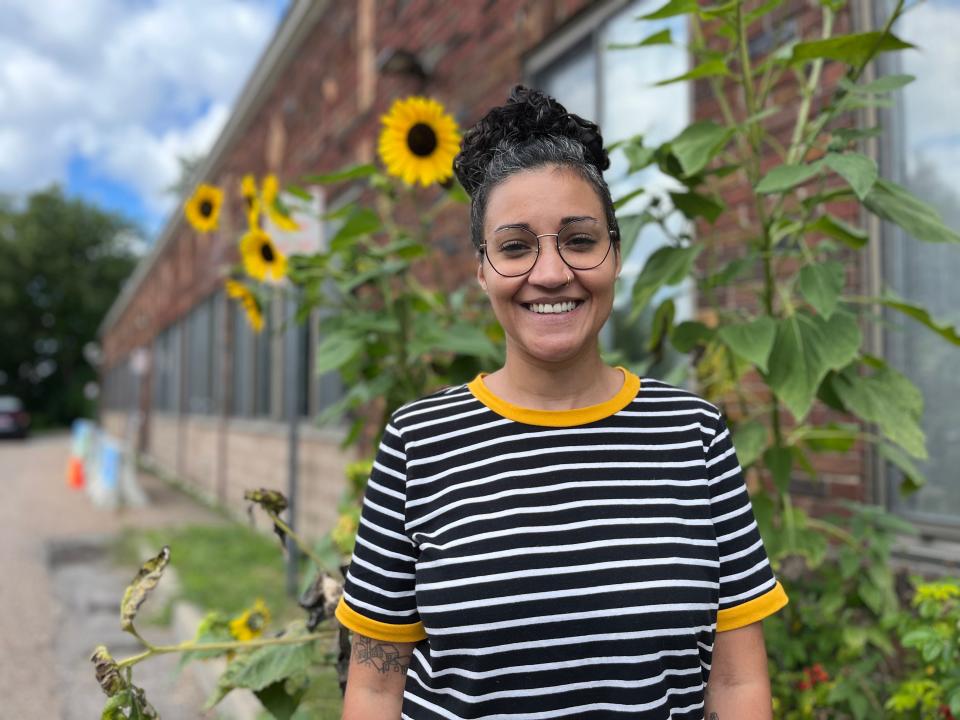
The root of the matter
Night had fallen in City Hall Park but the kids playing in the boldly lit fountains were not ready to go to bed yet. Speaking Quebecois French, the children weaved in and out of the streams of water, punching at them like Whac-a-Moles. Their screams of delight on the early August night made the park feel like a safe place.
A hundred yards away, people who were mingling on the northern edge of the park began raising their voices. Someone threw a punch and within minutes six police officers were on scene with EMTs arriving shortly after.
On the other side of College Street from the park, a group of women in brightly colored wigs walked past the spectacle.
“Other than that, Burlington is (expletive) amazing,” one of them said as they took in the police cars and ambulance.
The next morning, Rocko Wells, an unhoused man who was at the scene of the fight, said the guy who threw punches wasn’t arrested.
“Some kid was drunk and running his mouth,” Wells said.
City Hall Park’s juxtapositions cannot be boiled down to a single cause. But Lacey Smith, supervisor of social workers at the Burlington Police Department who has worked in the community for 15 years, sees a few root causes with clarity.
One of them is the lack of a daytime shelter and space to store belongings for unhoused people.
There are two daytime shelters in Burlington where people can go to charge their phone, hang out, get a meal, and seek resources. One is COTS Daystation, which is open every day, but is a dry shelter, meaning people who are actively using drugs cannot use the shelter. The other is Champlain Valley Office of Economic Opportunity's Community Resource Center which is open from 9 a.m. to 2:30 p.m. Monday-Friday and is currently under construction to expand the space.
More: Burlington seeks state money for overnight homeless shelter, extension of motel program
With one being inaccessible to those addicted to drugs and the other only being open part of the day and having limited space, Smith sees the day shelters as inadequate. Having nowhere to securely store belongings also leads to a conundrum for those who want to access services but don’t want to leave their belongings unattended.
“Those two issues really are compounded in City Hall Park,” Smith said.
Smith sees bigger picture flaws in the system as well. People who struggle with multiple conditions like substance use disorder and mental illness slip through the cracks more easily because certain organizations only serve certain demographics. This frustrates Smith.
“I spend time with these people and they don't inherently deserve to not have a place to go simply because of how complex their issues are,” Smith said.
Smith supervises four community service liaisons, or police social workers. Her team does proactive work by doing rounds around town and talking to people and also respond to calls when social services are needed. They work closely with the Howard Center's Street Outreach team who are usually the first point of contact when a mental health call comes. The city is now building a crisis response team which will consist of a mobile unit of social workers and nurses to better respond to mental health and drug use emergencies and prevent crisis from happening.
Lacey Smith
Smith tries to meet people where they are. She knows some of the people she works with aren’t ready to get sober, so she offers other assistance like connecting them with a doctor or helping them get a new ID.
“It's about having a presence and getting to know them in different ways because that relationship is what is going to lend people to want to start to do stuff differently,” Smith said. “It's not going to be about telling them what to do, or how to do it, or when to do, or where to do it, or any of those things because the vast majority of those people that are out there are well aware.”
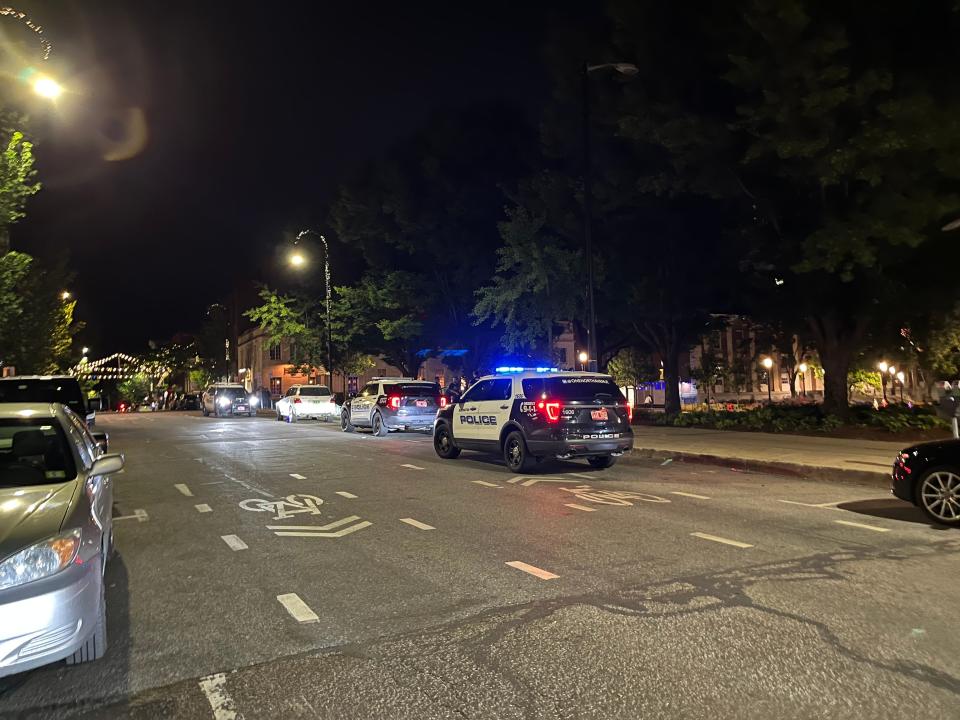
Much like some organizations that serve the unhoused population, Smith said treatment providers do not account for the presence of multiple conditions. Even though mental illness and drug addiction are usually closely connected, some mental health treatment programs won’t treat people who are addicted to drugs. And getting clean presents its own challenges.
Valley Vista, located in Bradford and Vergennes, and Serenity House in Wallingford are two of the major residential treatment centers in the state that help people get sober. Both programs are about two weeks long. People who have no housing sometimes return to the same environment they left after they graduate from the program and relapse, Smith said. The people Smith knows who have insisted on finding sober housing after going through treatment programs ended up moving out of state or at least out of Chittenden County to find options.
The housing shortage in Vermont, especially in the Burlington area, has severely limited how much people like Smith can help people, even though social service organizations have the money and programs to serve them. The recent loss of federal funding for COVID-era hotel housing exacerbated the strain, forcing 700 people across the state out of housing on June 1.
“Because we don't have the development, there's no flow,” Smith said. “We can't move the people from the streets into shelter into permanent housing.”
A less tangible but as important problem plagues people deep in poverty.
Recently, Smith agreed to help a man move. She realized she was the only person who had shown up to help when she arrived, despite him asking others.
“A lot of people don’t have a safety net, they don’t have a tribe, they don’t have their people in terms of people that are not even sober but that are safe and that they can trust,” Smith said.
A view from the gallery
It was a Monday morning in the park and everyone was in their usual places.
A group of people sat under the trees near St. Paul Street talking and smoking. A man took a photo of his son standing in the fountains. About 10 people milled around the benches at the north end of the park, some with carts and backpacks full of their belongings.
But amidst the quiet bustle of the July 31 morning, Burlington Parks, Recreation and Waterfront staff spotted a tent pitched at the north end of the park.
Camping is illegal in City Hall Park, along with drug and alcohol use and smoking. Police personnel and park rangers enforce these rules with warnings or tickets.
As one of the parks staff members approached the tent to confront the occupant, a switch flipped. A shouting match broke out between a man outside the tent and an urban park ranger as the ranger tried to move the tent and the man and his girlfriend’s belongings off park property. The yelling could be heard across the park.
Friction is a nearly everyday occurrence at City Hall Park, a fact artist Katherine Montstream is well acquainted with. She enjoys her St. Paul Street gallery’s view of the park and she likes Burlington City Arts programming there, but the musical performances and art markets do not cover up the suffering she sees.
Everyone coexists well, she said, until they don’t. Friction can happen at any time of day on any day of the week: during a Sunday morning classical music concert, a sunny Thursday afternoon, or late on a Wednesday night.

Confrontations make up some of the conflict: Police officers and parks employees enforcing rules and people pushing back. Substance use heightens emotions in other cases and leads to a shouting match that turns into a fist fight.
While Montstream's business has not been affected by the fights or the open drug use she witnesses, Montstream believes two things to be true: people in the park are struggling deeply and conflicts in the park sometimes make it less inviting than she wants it to be.
When physical conflict arises in the park, however, she feels conflicted when she reaches for the phone.
Sometimes police arrive and de-escalate the situation just by talking to people, Montstream said, but other times people are handcuffed and taken away, which she sees as a Ban-Aid to larger issues.
“I don't want to be like them and us, I think we're all one group of humans living in Burlington Vermont,” she said. “How do we respect each other and also understand that nobody asked to be addicted to opioids or heroin?”
Montstream doesn’t avoid the park. Most people she’s interacted with there are very polite, she said, and some try to prevent fights from escalating. Montstream does think more police or security presence in the park would be a good preventative measure to violence. She wishes the police treated City Hall Park like a beach with a lifeguard stand, never leaving it unattended.
“As long as everybody's on the same page of trying to help and de-escalate, I think that could be really useful and allow people who are maybe hesitant to walk through feel okay about that,” she said.
Loving people out of poverty
Police presence in the park is not appreciated by all.
On the afternoon of Aug. 2, a police officer patrolling the park went up to Matthew Fiducia, who was playing music on a portable speaker, and told him to turn the volume down. The interaction escalated into shouting when people around Fiducia began talking back to the police officer and eventually the officer asked for Fiducia’s ID. The encounter riled up everyone involved but after awhile the officer walked away, leaving only a verbal warning.
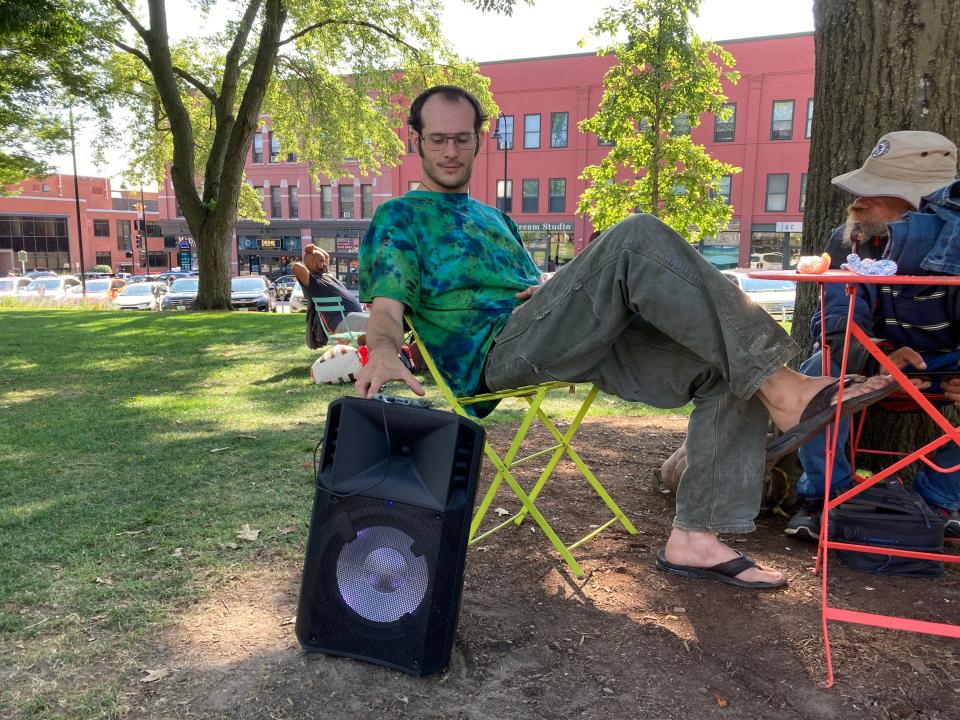
Ronni Liddell, 48, is known as Mom in City Hall Park. She goes to the park once or twice a week to see her “kids,” who aren’t her kids at all but adults, housed and unhoused, most of whom have been through life’s wringer, much like Liddell herself.
Liddell has witnessed tensions like the interaction between the police officer and Fiducia in the park for years. Some result in harsher consequences than a warning, including tickets of up to $200 for smoking. While Liddell does see the sense in enforcing drug and alcohol use in the park, she thinks there should be a designated area for smokers and containers to dispose of cigarette butts.
“We do give them a hard time when they try to enforce it, I’m not going to lie, because it’s ridiculous,” Liddell said. “They don’t want to enforce it, we don’t want to have it enforced, so why are we doing this? Why are you writing up a pointless ticket that’s not going to get paid? They’re wasting a piece of paper, you’re wasting your time, you’re wasting my time, it’s not going to stop.”
City Hall Park holds great significance for Liddell. She has been unhoused for eight of her 20 years living in Vermont, including in November 2021 when she had a heart attack in City Hall Park. She has now been housed for seven months with the upcoming promise of a year-long lease. Though she’s housed, she has kept up relationships with her friends who spend time at the park.
“This park is my everything,” Liddell said. “Even when we get housed, we’re still out here checking on people who aren’t.”
Liddell does her unofficial outreach work in honor of a teenager she met through the First Unitarian Universalist Society of Burlington in the early 2000s when she helped lead the children’s service. Kim was an 18-year-old who had lived in foster care most of her childhood and was aging out of the system. Liddell remembers Kim telling her that nobody wanted to adopt an 18-year-old with social issues. Kim’s words hit Liddell hard, and Liddell offered her a place to stay in her home. Soon after, the girl committed suicide while in the hospital for a mental health crisis.
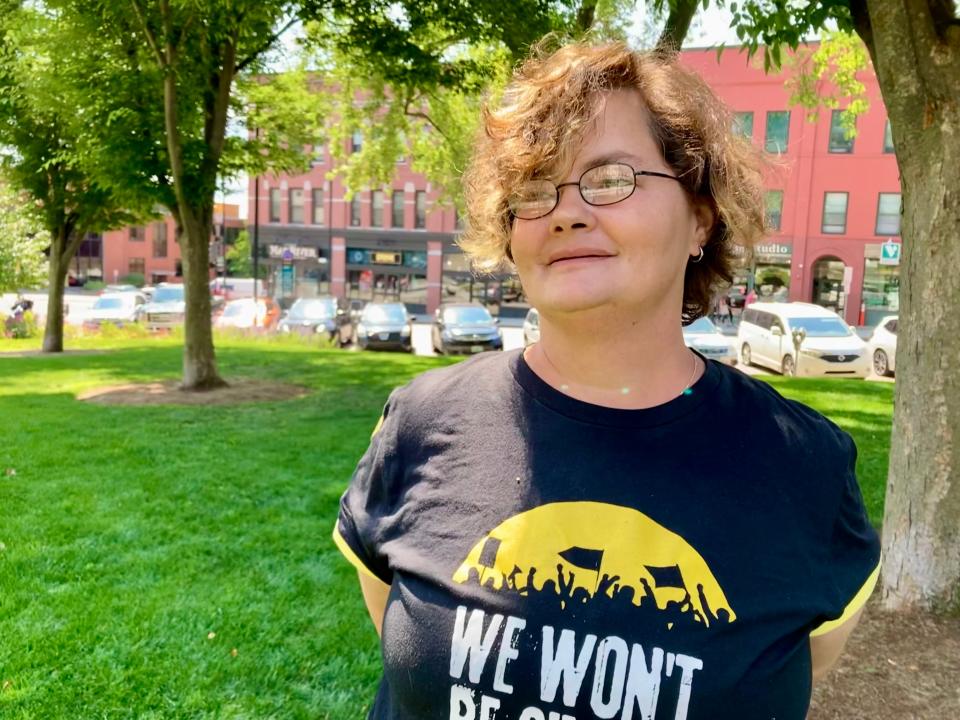
From Kim, Liddell learned how much people needed to hear that they were loved and wanted in the world. That mentality has guided her relationships with her City Hall Park family, as well as the principle of non-judgement.
“These kids, they do have parents but they’re not always steady in their lives and I’m not always steady in their lives, but they say to me things they can’t say to their parents,” Liddell said. “I’m friends with their parents and their parents are thankful to me because their kids are not in constant contact. I see their kids more than they see them.”
Liddell does not look at City Hall Park through rose-colored lenses, however. She knows some of the people who openly inject drugs and get drunk in the park and empathizes with them as a recovering addict. But she doesn’t like it. Liddell wants the park to be safe for the kids who play in the fountains and sees drug and alcohol consumption as the cause of many disturbances.
Her friends, the self-proclaimed “weed heads,” mostly hang out on the west side of the park. They aren’t perfect, Liddell said, because many are fighting to survive, but as several of them are parents themselves, they are mindful of the children who come to the park and stop smoking if kids get close to them. Liddell said they’ve surprised other parents by returning children who have wandered away from the splash pad.
“They're always, like, so surprised because they're, like, oh we think you guys are just stoners out here not paying attention,” she said. “No, you’re a parent not paying attention.”
More: Unhoused indefinitely: How an overwhelmed housing system has failed one Burlington woman
Liddell, who is trained as a nurse, also has empathy for the people who must enforce the park rules. She learned in her nursing education to see individuals as patients, not people, to lessen caregiver burnout. She thinks police and parks employees similarly depersonalize their interactions with people to protect themselves. Liddell herself has experienced caregivers’ burnout from trying to take care of people in City Hall Park. While she acknowledges the realities of burnout in these jobs, however, she doesn’t think it excuses aggressive demeanors or lack of respect.
Liddell spoke in Washington D.C. in June as a part of the Poor People’s Campaign’s National Speak Out to push lawmakers to address poverty. She spoke about her City Hall Park family.
“We’ve got to give them love," Liddell said on the steps of the U.S. Supreme Court. “If we give them love, we can pull them out of poverty.”
Beyond the park
Zach Williamson, festival director for Burlington City Arts, sat in the park on Aug. 16 listening to singer Aneken River. The performance was one of 24 summer lunch break concerts BCA puts on, none of which have been interrupted by major mental health crisis or confrontations, Williamson said.
“When the music happens, whether it’s a DJ or a classical concert or a performer like this, people chill out,” he said. “It does that to everybody whether you’re a housed person or a houseless person, it’s good for everybody.”
Williamson is aware of the general complaints on his Front Porch Forum page about City Hall Park. Because much of his work is improving people’s experience of the park, the posts sometimes frustrate him. BCA spent $52,350 on musicians and DJs this summer for all their concerts combined, a number Williamson is proud of because it supports local artists.
“Everybody has their own experience,” he said. “But if you have an open mind and you understand your community, I think this is a great place.”
As a former professional sound designer, Williamson always believed in the power of the arts, but until he was festival director for BCA, he had never seen arts programming make as big of an impact in the community as the programming in City Hall Park.
Everything, however, has its limits. As an unhoused man walks in front of the stage where Aneken River sings, Williamson acknowledges that no amount of arts programming, urban park rangers, police, private security, and non-profit presence will cure the causes of camping, fighting and drug use.
“There’s a larger problem that goes beyond this park.”
Reporting interns Isabella Infante and Kate Sadoff contributed to the reporting of this story.
Contact Urban Change Reporter Lilly St. Angelo at lstangelo@gannett.com. Follow her on Twitter: @lilly_st_ang.
This article originally appeared on Burlington Free Press: Burlington City Hall Park: Homelessness next to kids in fountain

